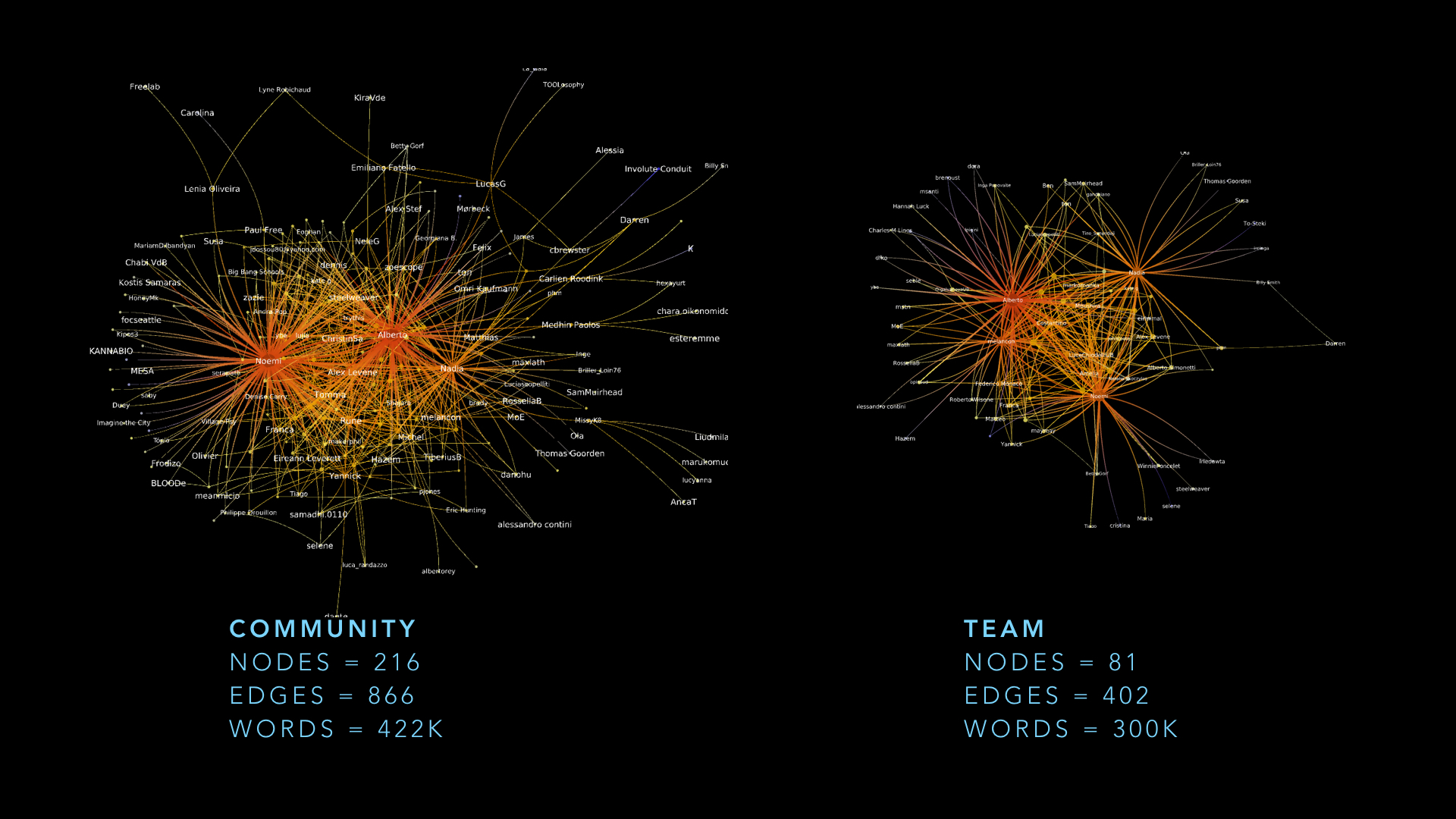
Quite a few curious people who participate in the OpenCare conversation about care end up engaging with the research team in a different conversation: the one about OpenCare as a research project. This is a lovely side effect of OpenCare’s radical transparency. We practice a sort of open notebook science. We don’t publish only results, but also questions, doubts, within-team disagreements, half-baked ideas. This is made more effective by a specificity of OpenCare: the community and the team are in separate “rooms” of the same online platform, edgeryders.eu. People who hang around it can’t help noticing the stream of research project updates. Some of them engage.
This was expected. But I was not expecting the magnitude of the effect. 81 people have contributed at least one comment to the research team space. The team’s own numerosity fluctuates, but it’s about 20. The others are just people from the community who drop in to ask questions or make suggestions. And they outnumber us three to one.
In the network diagrams, nodes are color- and size coded by in-degree. You can think of in-degree as a measure of the interest that the person’s contribution elicits in the conversation. By this metric, it is clear that self-selected community members who just jump in are making a major contribution to the OpenCare research effort. The highest in-degree individuals who are not affiliated with any of the partners are @Federico_Monaco (ranks 7th by in-degree), @Rune (ranks 13th) and @Francesco_Maria_ZAVA (ranks 16th).
The conversation about OpenCare as a project (to the right of the picture) is of the same order of magnitude as that about open care as a potential pathway to societal well-being (to the left). It needs to be said, however, that the former has a lot of menial content: agreeing about a time and place to meet, requesting administrative information etc.
What are the consequences of all this activity? More diversity in research. More space for participation. With a bit of luck, more and higher quality scientific output. My favourite story is this: a community member, the already mentioned Federico Monaco, has proposed we do a paper together. He had found a call for papers in a journal he follows, and thought it a good fit. His proposal stirred the rest of the team into action. His thread received over 50 comments. A draft abstract was then uploaded onto a public wiki for community scrutiny and feedback.
Many people sent contributions large and small. The large ones (example: that of Ezio – here) did most of the heavy lifting. But the process had a role also for smaller ones. People like myself, who did not feel confident to step in as co-authors, were able to offer some small help without having to take responsbility for the whole thing. Federico led with a firm but light touch, asking everyone who volunteered any thought what role they wanted to play in the paper. For example, @Yannick – also not a member of the OpenCare team – was offered co-authorship (but declined). All of this happened out in the open. As you read the whole thread, you can see ideas form through the discussion of the co-authors. Collective intelligence about collective intelligence!
Interdisciplinarity happened quite naturally as a result of the open process. The final submission listed five authors: Federico himself (a medical anthropologist); @Ezio_Manzini (a designer for social innovation); @Noemi (a social scientist); @Amelia (an ethnographer); myself (a network scientist). How cool is that?
Another advantage of doing things this way is increased accountability to the people who take part in the main conversation, the one about care. Through the research team forum, they can ask question and make proposals. This should mitigate the perceived risk of researchers taking an exploitative attitude towards people’s contributions. The operative word here is “perceived”. We have the best intentions, but we recognize this is not enough. We are determined to demonstrate them to the community, and transparency goes a long way towards doing it.
I think that, together, we are making OpenCare… open. I had never had the luxury of running a research project with such transparency. I like it a lot, and hope to keep doing so in the future. What do others think?
